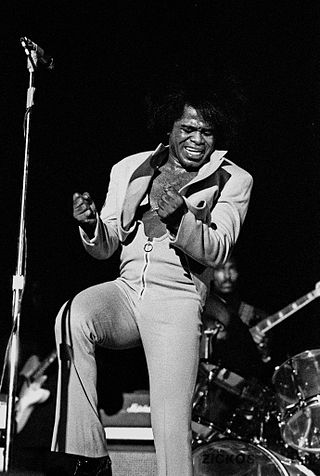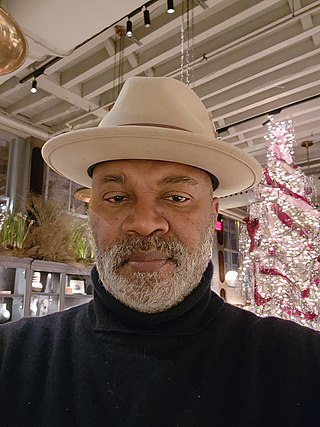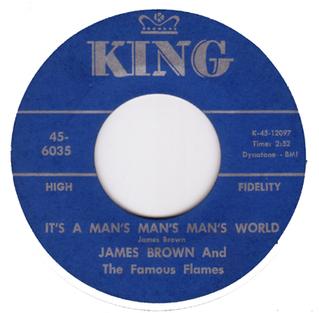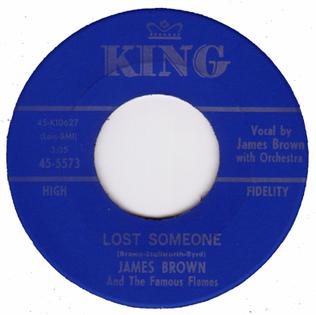
James Joseph Brown was an American singer, dancer and musician. The central progenitor of funk music and a major figure of 20th-century music, he is referred to by various honorific nicknames, among them "the Hardest-Working Man in Show Business", "Godfather of Soul", "Mr. Dynamite", and "Soul Brother No. 1". In a career that lasted more than 50 years, he influenced the development of several music genres. Brown was one of the first 10 inductees into the Rock and Roll Hall of Fame on January 23, 1986.

Clyde Austin Stubblefield was an American drummer best known for his work with James Brown, with whom he recorded and toured for six years (1965-70). His syncopated drum patterns on Brown's recordings are considered funk standards. Samples of his drum performances were heavily used in hip hop music beginning in the 1980s, although Stubblefield frequently received no credit.

"I Got You (I Feel Good)" is a song by American singer James Brown. First recorded for the album Out of Sight and then released in an alternate take as a single in 1965, it was his highest-charting song and is arguably his best-known recording. In 2013, the 1965 recording was inducted into the Grammy Hall of Fame.

Jazz-funk is a subgenre of jazz music characterized by a strong back beat (groove), electrified sounds, and an early prevalence of analog synthesizers. The integration of funk, soul, and R&B music and styles into jazz resulted in the creation of a genre whose spectrum is quite wide and ranges from strong jazz improvisation to soul, funk or disco with jazz arrangements, jazz riffs, jazz solos, and sometimes soul vocals.
"Soul Power" is a song by James Brown. Brown recorded it with the original J.B.'s and it was released as a three-part single in 1971. Like "Get Up Sex Machine" and other hits from this period it features backing vocals by Bobby Byrd. It charted #3 R&B and #29 Pop.

Nelson George is an American author, columnist, music and culture critic, journalist, and filmmaker. He has been nominated twice for the National Book Critics Circle Award.
"There Was a Time" is a song written and performed by James Brown.

"It's a Man's Man's Man's World" is a song written by James Brown and Betty Jean Newsome. Brown recorded it on February 16, 1966, in a New York City studio and released it as a single later that year. It reached No. 1 on the Billboard R&B chart and No. 8 on the Billboard Hot 100. Its title is a word play on the 1963 comedy film It's a Mad, Mad, Mad, Mad World.
"Cold Sweat" is a song performed by James Brown and written with his bandleader Alfred "Pee Wee" Ellis. Brown recorded it in May 1967. An edited version of "Cold Sweat" released as a two-part single on King Records was a No. 1 R&B hit, and reached number seven on the Pop Singles chart. The complete recording, more than seven minutes long, was included on an album of the same name.

"The Payback" is a funk song by James Brown, the title track from his 1973 album of the same name. The song's lyrics, originally written by trombonist and bandleader Fred Wesley but heavily revised by Brown himself soon before it was recorded, concern the revenge he plans to take against a man who betrayed him. The song is notable for its sparse, open arrangement and its use of wah-wah guitar – a relative rarity in Brown's previous funk recordings. Released as a two-part single in February 1974, it was the first in an unbroken succession of three singles by Brown to reach #1 on the R&B charts that year – the last chart-toppers of his career. It also peaked at number 26 on the Billboard Hot 100. It was his second, and final, single to be certified gold by the RIAA.

"Get Up Offa That Thing" is a song written and performed by James Brown. It was released in 1976 as a two-part single. It reached #4 on the R&B chart, briefly returning Brown to the Top Ten after a year's absence, and #45 on the Billboard Hot 100. Thanks to its chart success, the song became Brown's biggest hit of the late 1970s. The song's lyrics urge listeners to "Get up offa that thing / and dance 'til you feel better." Due to his troubles with the IRS for failure to pay back taxes, Brown credited authorship of the song to his wife Deidre and their daughters, Deanna and Yamma Brown.

"Funky President (People It's Bad)" is a funk song by James Brown. Released as a single in 1974, it charted No. 4 R&B. It also appeared on the album Reality. According to Brown the "funky president" of the song's title was meant to refer to U.S. President Gerald Ford, who had succeeded Richard Nixon in the White House shortly before it was recorded.

"(Do the) Mashed Potatoes" is a rhythm and blues instrumental. It was recorded by James Brown with his band in 1959 and released as a two-part single in 1960. For contractual reasons the recording was credited to "Nat Kendrick and the Swans".

"Lost Someone" is a song recorded by James Brown in 1961. It was written by Brown and Famous Flames members Bobby Byrd and Baby Lloyd Stallworth. Like "Please, Please, Please" before it, the song's lyrics combine a lament for lost love with a plea for forgiveness. The single was a #2 R&B hit and reached #48 on the pop chart. According to Brown, "Lost Someone" is based on the chord changes of the Conway Twitty song "It's Only Make Believe". Although Brown's vocal group, The Famous Flames did not actually sing on this tune, two of them, Bobby Byrd, and "Baby Lloyd " Stallworth, co-wrote it with Brown, and Byrd plays organ on the record, making it, in effect, a James Brown/Famous Flames recording.

"Out of Sight" is a funk song recorded by James Brown in 1964. A twelve-bar blues written by Brown under the pseudonym "Ted Wright", the stuttering, staccato dance rhythms and blasting horn section riffs of its instrumental arrangement were an important evolutionary step in the development of funk music.
"Talkin' Loud and Sayin' Nothing" is a funk song written by James Brown and Bobby Byrd. Recorded in 1970 by Brown and the original J.B.'s with Byrd on backing vocals and updated with a new melody, it was twice released as a two-part single in 1972. It also appeared on the album There It Is.
"Maybe the Last Time" is a song written by James Brown and recorded by Brown and the Famous Flames in 1964. It was released as the B-side of "Out of Sight" and was also included on the Out of Sight album. Brown described it as "a heavy gospel-based number, all about appreciating friends and everything while you can because each time you see somebody may be the last time, you don't know." It was the last studio recording Brown made with the Famous Flames, although the singing group continued to perform live with him for several more years.
"Coldblooded" is a song written and recorded by James Brown. It was released in 1974 as the B-side of "Funky President " and charted #99 Pop. It also appeared on the album Hell. Writing in Rolling Stone, Robert Palmer praised the song as a "sure-fire disco [smash], the kind of no-nonsense party music one expects from Soul Brother Number One."
"Regrets" is a song by Barbara Wyrick. Originally written for Marie Osmond, it was instead recorded by James Brown. Released as a single in 1980, it reached #63 on the R&B chart. It also appeared on the album People. Writing in The Village Voice, Thulani Davis described it as "sentimental, nice enough but not at all compelling."
Fred Thomas is an American bassist best known for his work with singer James Brown for over thirty years. He performed on many R&B hits of the 1970s. His last recording is on the 2018 album We Came to Play.












